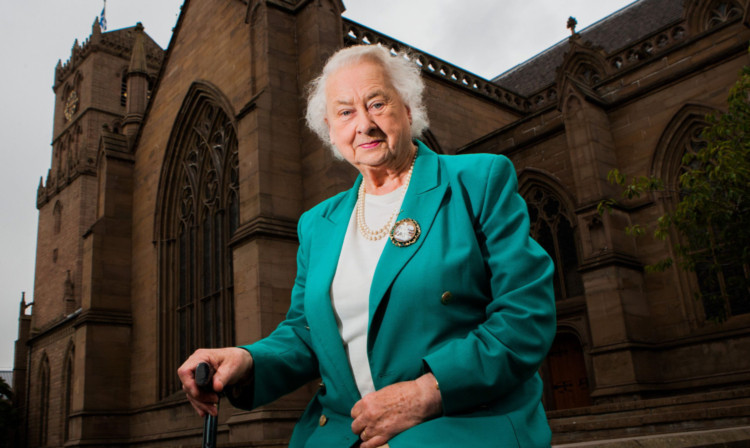The war memorial in St Mary’s Parish Church on the Nethergate in Dundee pays tribute to those soldiers who gave their lives in the First World War.
Lyon Ogilvie Duncan Jeffery, who served with the Fourth Battalion, Black Watch, and fell at the very height of the conflict in 1917, is one of those honoured.
But almost a century on from his death, his niece, Helen Milne, has discovered a problem with the plaque the commemoration reads Jeffres instead of Jeffery.
“I first noticed the mistake two or three years ago,” said Mrs Milne, who is 85.
“My uncle was just a young lad serving with the Fourth Battalion of The Black Watch when he passed away. There were an awful lot of boys from around here who were killed. It was just pure murder.”
In the third Battle of Ypres, the fourth and fifth battalions of The Black Watch, made up of men from Dundee and Angus, including Mr Jeffery, suffered such horrendous losses they were reduced from battalion to company strength.
That means their numerical strength dropped from about 1,000 soldiers to about 200.
Despite the mistake on the memorial, Mrs Milne is not asking for it to be changed, just that the mistake be recognised for future reference.
“I read in The Courier about the preparations for the centenary of the Great War,” Mrs Milne explained.
“If someone is doing a book (about the Dundee war dead) it would be nice to put the right name in it.”
It is not uncommon for people to make a mistake with the spelling of the surname, Mrs Milne said, but it was the addition of the ‘s’ to the name that really concerned her.
“My father came up here from England. They spell it Jeffery there, but often people write Jeffrey. I don’t mind that so much, but I don’t like Jeffres,” she said.
It is believed the memorial was erected in 1919 or 1920, possibly by The Black Watch themselves, although this cannot be verified.
The Commonwealth War Graves Commission are not responsible for the memorial in Dundee, but say that misspelling of the names of First World War soldiers is not unheard of.
Spokesman Jeroen Roskam: “It is not that uncommon for the names of soldiers serving in the First World War to be misspelt.
“The spelling of names is related to the service records made at the time.
“These records were handwritten and it was not unheard of for mistakes to occur when the records were copied.
“There are thousands of these records and the handwriting can be difficult to read. It is a very labour-intensive exercise.”
August 4 2014 will mark exactly 100 years since Great Britain declared war on Germany.
